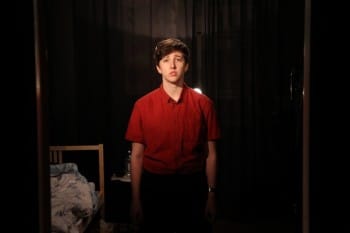Review: Montague Basement’s Kaleidoscope
Montague Basement’s Kaleidoscope invites us into Gabriel’s bedroom. He’s grappling with adulthood, identity and relationships, not to mention being transgender and queer in a less-than understanding society.

By young playwright Charles O’Grady, Kaleidoscope is both touching and funny, using an insightful framework – Gabe’s morning routine – to take us through his insecurities, anxieties, and identity (and plenty of costume changes). Oliver Ayres is Gabe, and his lovably self-effacing performance captures hearts.
With a trio of directors – Charles O’Grady, Imogen Gardam, and Finn Davis – the play could run into a host of problems, but their visions must have aligned perfectly: the play moves with an assured, relaxed pace and natural rhythm.
O’Grady’s script, aided by the clear direction, explores hefty topics, (family, love and work), while remaining authentic to the morning routine experience. Although the script is filled with self-analysis and revelation, these discussions rarely feel forced or too expository. The play effectively confronts the depths of gender dysmorphia, mental illness, and the negative experiences Gabe has faced through his coming out, and it doesn’t shy away from the challenging and uncomfortable reality of these issues. O’Grady balances these sobering moments with humour and light-hearted pop-culture references, treading lightly between moods; it feels like real life, and it’s not long before we’re rooting for Gabe to succeed.
It runs slightly too long, and a moment where Gabe passes through his mirror to embody the negative, critical voice he’s been grappling with throughout the play feels too obvious and simple. Gabe’s alter ego talks directly with the audience, teaching them about gender dysmorphia and the experience of feeling out of place in your own body, overloading us with metaphors and descriptions. Whilst this may be helpful to some, the play had already done such an effective job of showing us these truths; it felt unnecessary to be told again. Despite this, the ending felt hopeful; a touching conclusion to a poignant journey.
As O’Grady stated before the performance, this show is by no means a representation of all trans and queer experiences; it’s merely one man’s journey towards loving himself against the norms of society. His struggles with accepting himself are universal, but hopefully this play will also raise important discussions regarding queer and trans experiences. This piece advocates and educates, and is also a heartfelt and touching story to watch, with a central character that is amirable and relatable to many.




